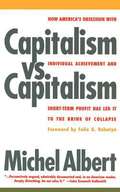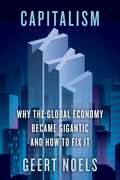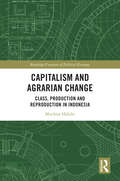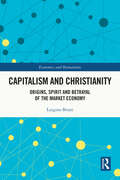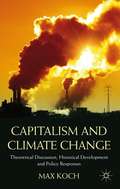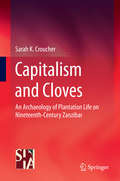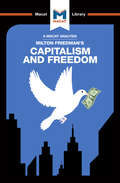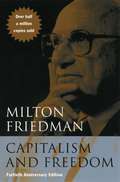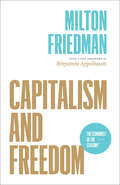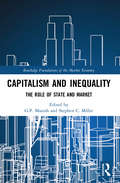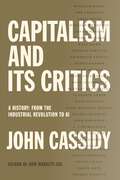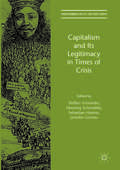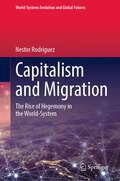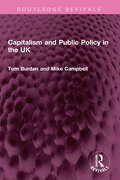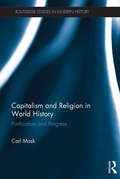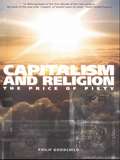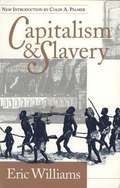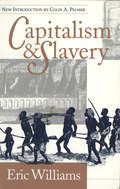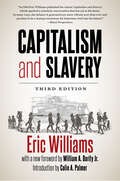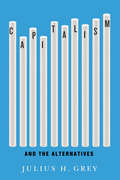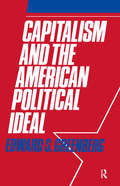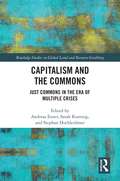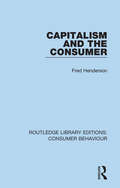- Table View
- List View
Capitalism Vs. Capitalism: How America's Obsession with Individual Achievement and Short-term Profit Has Led It to the Brink of Collapse
by Michael Albert Felix G. Rohatyn Paul HavilandThe author believes two approaches are currently used in defining the economic policy of a nation: a Rhine model which emphasizes collective achievement and public consensus, and a supply-side model based on individual achievement and short-term profits. Favoring the Rhine approach, he urges the adoption of specific policy changes by the Us and other governments, which he believes will lead to a more balanced economy and society.
Capitalism XXL: Why the Global Economy Became Gigantic and How to Fix It
by Geert NoelsOur world is suffering from economic gigantism. Under the current capitalist system huge companies and organizations are becoming even larger and more powerful, creating a Champions League effect that kills healthy competition, doesn’t consider sustainable growth, and leaves workers feeling pressured and susceptible to burnout.Capitalism XXL makes it clear that current rules of capitalism favour bigness in an unfair way, and that a general unease with the capitalist system is growing. The trend for bigness goes beyond businesses: schools, hospitals, libraries, and all kinds of organizations, misled by economies of scale, have consolidated. A larger entity can seem attractive for its short-term financial gains, but the results produce enormous social costs. Rather than dismantling the capitalist system in favour of neo-Marxism, Geert Noels argues, we have to instead go back to the roots of capitalism and embrace its traditional principles as written by Adam Smith in the eighteenth century.Capitalism XXL makes the case for changing the rules in order to tame the giants and restore the individual to the world economy. Guided by history, Noels proposes an approach to capitalism that considers all human dimensions – social, ecological, and economic – and describes a sustainable future economy that will not burden the generations to come with debt, social inequality, and a natural environment that is damaged beyond repair.
Capitalism and After: The Rise and Fall of Commodity Production
by George ThomsonThis is intended to provide, in a form suitable for beginners, a brief introduction to historical materialism, with special attention to the role of commodity production in the history of civilization.
Capitalism and Agrarian Change: Class, Production and Reproduction in Indonesia (Routledge Frontiers of Political Economy)
by Muchtar HabibiSmall-scale agricultural producers in the peripheral world are often condescendingly assumed to be a single social class (‘the peasantry’) to be pitted against the state or corporation. This book challenges this rather idealistic view by demonstrating that under current capitalist social relations (competition, efficiency and productivity, and profit maximisation), these agricultural producers have been differentiated into different agrarian classes by exploitation. By comparing two different contexts of local agrarian change in Indonesia—rice cultivation in Java and oil palm in Sumatra—this book exposes the different class locations of the agrarian classes among petty agricultural producers and the class relations between them. These are often inextricably linked to gender, clanship and generational issues. The power of class dynamics crucially shapes how agricultural production in both rice and oil palm is organised. The share received by different agrarian classes from the production site then prominently shapes the different nature of class reproduction for each agrarian class. This analysis demonstrates that the different agrarian classes possess different capacities and responses in their relation to the state or corporations. Any real emancipation attempt in the Indonesian countryside (and beyond) must start from a proper understanding of these class dynamics. This book marks a significant contribution to the literature on agrarian change, the political economy of development, rural development and Marxist political economy.
Capitalism and Christianity: Origins, Spirit and Betrayal of the Market Economy (Economics and Humanities)
by Luigino BruniDrawing on debates about the religious nature and origins of contemporary European capitalism, this book argues for a distinction between a Northern/Protestant and a Southern/Catholic spirit of capitalism. The first part of the book explores the history of the relationship between capitalism and Christianity. Going back much further than Weber’s “protestant ethic” arguments, it looks at the early centuries of Christianity from the gospels to Augustine and follows the story through the Middle Ages – with special attention devoted to the role of Monasticism and Franciscanism – to modernity. The second part of the book analyses the origin of the “southern spirit of capitalism: before and after Luther and the Calvinist Reformation. It highlights the key features which demonstrate that the Catholic spirit of capitalism is, in fact, different from the Anglo-Saxon spirit. This book will be of interest to readers in history of economic thought, history of capitalism, economic ethics and religious history.
Capitalism and Class in the Gulf Arab States
by Adam HaniehThe six Arab states of the Gulf Cooperation Council (GCC) play an increasingly prominent role in the global economy and throughout the broader Middle East region. This book analyzes the recent development of Gulf capitalism through to the aftermath of the 2008 economic crisis. Situating the Gulf within the evolution of capitalism at a global scale, it presents a novel theoretical interpretation of this important region of the Middle East political economy. Accompanied by an extensive empirical analysis of all sectors of the GCC economy, the book argues that a new capitalist class, Khaleeji Capital, is forming in the Gulf - with profound implications for the Middle East as a whole.
Capitalism and Climate Change: Theoretical Discussion, Historical
by Max KochThis book discusses climate change as a social issue, examining the incompatibility of capitalist development and Earth's physical limits and how these have been regulated in different ways. It addresses the links between modes of consumption, energy regimes and climate change during Fordism and finance-driven capitalism.
Capitalism and Cloves: An Archaeology of Plantation Life on Nineteenth-Century Zanzibar
by Sarah K. CroucherThis study of nineteenth-century clove plantations on Zanzibar provides an important contribution to debates in global historical archaeology. Broadening plantation archaeology beyond the Atlantic World, this work addresses plantations run by Omani Arab colonial rulers of Zanzibar. Drawing on archaeological and historical data, this book argues for the need to examine non-Western contexts of colonialism and capitalism as coeval with those in the North Atlantic World. This work explores themes of capitalism, colonialism, plantation landscapes, African Diaspora communities, gender and sexuality, locally produced and imported goods in historic contexts, and Islamic historical archaeology.
Capitalism and Freedom
by Sulaiman HakemyMilton Friedman was arguably the single most influential economist of the 20th-century. His influence, particularly on conservative politics in America and Great Britain, substantially helped – as both supporters and critics agree – to shape the global economy as it is today. Capitalism and Freedom (1962) is a passionate but carefully reasoned summary of Friedman’s philosophy of political and economic freedom, and it has become perhaps his most directly influential work. Friedman’s argument focuses on the place of economic liberalism in society: in his view, free markets and personal economic freedom are absolutely necessary for true political freedom to exist. Freedom, for Friedman, is the ultimate good in a society – the marker and aim of true civilisation. And, crucially, he argues, real freedom is rarely aided by government. For Friedman, indeed, “the great advances of civilization, whether in architecture or painting, in science or literature, in industry or agriculture, have never come from centralized government”. Instead, he argues, they have always been produced by “minority views” flourishing in a social climate permitting variety and diversity.” In successive chapters, Friedman develops a well-structured line of reasoning emerging from this stance – leading him to some surprising conclusions that remain persuasive and influential more than 60 years on.
Capitalism and Freedom (40th Anniversary Edition)
by Milton Friedman Rose D. FriedmanHow can we benefit from the promise of government while avoiding the threat it poses to individual freedom? In this classic book, Milton Friedman provides the definitive statement of his immensely influential economic philosophy -- one in which competitive capitalism serves as both a device for achieving economic freedom and a necessary condition for political freedom. The result is an accessible text that has sold well over half a million copies in English, has been translated into eighteen languages, and shows every sign of becoming more and more influential as time goes on.
Capitalism and Freedom (None Ser.)
by Milton FriedmanOne of the most significant works of economic theory ever written, from the “outstanding [and] unfailingly enlightening” Milton Friedman (Newsweek).One of Time magazine’s All-Time 100 Best Nonfiction BooksOne of Times Literary Supplement’s 100 Most Influential Books Since the WarOne of National Review’s 100 Best Nonfiction Books of the CenturyOne of Intercollegiate Studies Institute’s 50 Best Books of the 20th CenturyHow can we benefit from the promise of government while avoiding the threat it poses to individual freedom? In this classic book, Milton Friedman provides the definitive statement of an immensely influential economic philosophy—one in which competitive capitalism serves as both a device for achieving economic freedom and a necessary condition for political freedom.First published in 1962, Friedman’s Capitalism and Freedom is one of the most significant works of economic theory ever written. Enduring in its eminence and esteem, it has sold nearly a million copies in English, has been translated into eighteen languages, and continues to inform economic thinking and policymaking around the world. This new edition includes prefaces written by Friedman for both the 1982 and 2002 reissues of the book, as well as a new foreword by Binyamin Appelbaum, lead economics writer for the New York Times editorial board.
Capitalism and Inequality: The Role of State and Market (Routledge Foundations of the Market Economy)
by G. P. Manish Stephen C. MillerCapitalism and Inequality rejects the popular view that attributes the recent surge in inequality to a failure of market institutions. Bringing together new and original research from established scholars, it analyzes the inequality inherent in a free market from an economic and historical perspective. In the process, the question of whether the recent increase in inequality is the result of crony capitalism and government intervention is explored in depth. The book features sections on theoretical perspectives on inequality, the political economy of inequality, and the measurement of inequality. Chapters explore several key questions such as the difference between the effects of market-driven inequality and the inequality caused by government intervention; how the inequality created by regulation affects those who are less well-off; and whether the economic growth that accompanies market-driven inequality always benefits an elite minority while leaving the vast majority behind. The main policy conclusions that emerge from this analysis depart from those that are currently popular. The authors in this book argue that increasing the role of markets and reducing the extent of regulation is the best way to lower inequality while ensuring greater material well-being for all sections of society. This key text makes an invaluable contribution to the literature on inequality and markets and is essential reading for students, scholars, and policymakers.
Capitalism and Its Critics: A History: From the Industrial Revolution to AI
by John CassidyA Financial Times Most Anticipated Book of 2025A sweeping, dramatic history of capitalism as seen through the eyes of its fiercest critics. At a time when artificial intelligence, climate change, inequality, trade wars, and a right-wing populist backlash to globalization are raising fundamental questions about the economic system, Capitalism and Its Critics provides a kaleidoscopic history of global capitalism, from the East India Company and Industrial Revolution to the digital revolution. But here John Cassidy, a staff writer at The New Yorker and a Pulitzer Prize finalist, adopts a bold new approach: he tells the story through the eyes of the system’s critics. From the English Luddites who rebelled against early factory automation to communists in Germany and Russia in the early twentieth century, to the Latin American dependistas, the international Wages for Housework campaign of the 1970s, and the modern degrowth movement, the absorbing narrative traverses the globe. It visits with familiar names―Smith, Marx, Luxemburg, Keynes, Polanyi―but also focuses on many less familiar figures, including Flora Tristan, the French proponent of a universal labor union; Thomas Carlyle, the conservative prophet of the moral depredations of the market; John Hobson, the original theorist of imperialism; J. C. Kumarappa, the Indian exponent of Gandhian economics; Eric Williams, the Trinidadian author of a famous thesis on slavery and capitalism; Joan Robinson, the Cambridge economist and critic of Keynes; and Samir Amin, the leftist French-Egyptian economist and analyst of globalization.Blending rich biography, panoramic history, and lively exploration of economic theories, Capitalism and Its Critics is true big history that illuminates the deep roots of many of the most urgent issues of our time.
Capitalism and Its Legitimacy in Times of Crisis (Transformations of the State)
by Sebastian Haunss Steffen Schneider Henning Schmidtke Jennifer GronauThis volume examines why the 2008 financial crisis with the subsequent Great Recession did not foster a major institutional transformation of the capitalist market economy. It highlights the role of ideas and public discourse in explaining institutional stability and change in the wake of economic crises and other critical junctures. Examining legitimation discourse in four OECD countries (Germany, Switzerland, the United Kingdom and the United States) between 1998 and 2011, the contributions to the volume use different text-analytical methods to bring out the ideas that underpin affirmative and critical media discourse on the capitalist regime. Individual chapters focus on the contours and trajectories of legitimation discourse before and after the financial crisis, on the attribution of responsibility for the crisis, on the use of metaphors and narratives, and on the formation of discourse coalitions challenging the regime. Together, they show that the post-2008 legitimation crisis of the capitalist market economy did not result in its sustained delegitimation or in powerful new ideas that might have mobilized support for radical institutional change. The book will appeal to students and scholars of economic sociology, media studies and political science.
Capitalism and Migration: The Rise of Hegemony in the World-System (World-Systems Evolution and Global Futures)
by Nestor RodriguezThis book explores the role of capital and labor migration in the expansion of the capitalist world-system. It presents comprehensive case studies on various historical periods of hegemony recognized by world-system theory: the Dutch hegemony (1625-1675), British hegemony (1815-1873), and US hegemony (1945-1970). Moreover, the book identifies an earlier period of economic dominance in Western Europe when merchant-bankers from Florence dominated the regional wool trade in the early thirteenth century. In these four intervals of dominance, i.e., from the medieval period to the late twentieth century, capital and labor migration formed the basis of capitalist development in the hegemonic core states as well as in peripheral regions under their economic and political influence. In turn, the book analyzes the migration patterns associated with the rise of hegemony from the perspectives of class relations between employers and workers, technological advances at the workplace, economic cycles, and state policies on labor migration. It concludes with a projection that heightened migration will continue to characterize the capitalist world system, especially as many poor and displaced populations in peripheral regions resort to migration for survival. Accordingly, it appeals to scholars in the fields of politics, sociology, history, anthropology, and economics who are interested in globalization and world-system analysis.
Capitalism and Public Policy in the UK (Routledge Revivals)
by Mike Campbell Tom BurdenFirst published in 1985, Capitalism and Public Policy in the UK provides a comprehensive account of the development, contemporary character and impact of public policy in the UK. It relates public policy to the distinctive features of capitalism, class relations and the state. The first chapter is used to outline the theoretical framework adopted throughout the book. This sees public policy as strongly influenced by the requirements of the capitalist mode of production, the balance of class forces, historical influences, gender divisions and international relations. Each of the subsequent chapters focuses on a particular area of policy. The relevant theoretical concepts are first introduced followed by an historical account of the development of policy with particular emphasis on the post-1945 period. Where appropriate the impact of a particular area of policy on inequalities of class, gender, race and age is examined. Finally, the impact of each area of policy and the state to the process of economic change, to class relations and to other social divisions. It will be of interest to all those studying the state, public policy and political economy generally.
Capitalism and Religion in World History: Purification and Progress (Routledge Studies in Modern History)
by Carl MoskPurity condemns filth; piety disparages corruption. Amassing riches offered to a transcendental world, the priests of ancient faiths found themselves trapped in contradiction. By loaning out their resources to merchants, they made themselves pariahs to true prophets. Before Islam squared the circle, bringing capital mobility and credit creation into coexistence with devotion, religion stymied merchant capitalism. Spread through trade, Islam's innovations in commerce soothed the path to coexistence of credit and faith globally. Had a second form of capitalism - technological capitalism - not emerged, binding science to innovation, harmony between faith and capitalism would have prevailed. However, scientific advances deepen on empirical evidence that is buttressed by critical debate, which is anathema to powerful elites in countries saturated with religious nationalism. Consequently, easy cooperation between capitalism and religion is blocked in these lands, and so their potential for economic progress withers. Thus, many of these states, trapped in the invidious stranglehold of religion, are condemned to sustained poverty.
Capitalism and Religion: The Price of Piety
by Philip GoodchildOur global ecological crisis demands that we question the rationality of the culture that has caused it: western modernity's free market capitalism. Philip Goodchild develops arguments from Nietzsche, Adorno, Horkheimer, and Marx, to suggest that our love of Western modernity is an expression of a piety in which capitalism becomes a global religion, in practice, if not always in belief. This book presents a philosophical alternative that demands attention from philosophers, critical theorists, philosophers of religion, theologians, and those in ecological politics.
Capitalism and Slavery
by Eric WilliamsSlavery helped finance the Industrial Revolution in England. Plantation owners, shipbuilders, and merchants connected with the slave trade accumulated vast fortunes that established banks and heavy industry in Europe and expanded the reach of capitalism worldwide. Eric Williams advanced these powerful ideas in Capitalism and Slavery, published in 1944. Years ahead of its time, his profound critique became the foundation for studies of imperialism and economic development. Binding an economic view of history with strong moral argument, Williams's study of the role of slavery in financing the Industrial Revolution refuted traditional ideas of economic and moral progress and firmly established the centrality of the African slave trade in European economic development. He also showed that mature industrial capitalism in turn helped destroy the slave system. Establishing the exploitation of commercial capitalism and its link to racial attitudes, Williams employed a historicist vision that set the tone for future studies. In a new introduction, Colin Palmer assesses the lasting impact of Williams's groundbreaking work and analyzes the heated scholarly debates it generated when it first appeared.
Capitalism and Slavery
by Eric WilliamsSlavery helped finance the Industrial Revolution in England. Plantation owners, shipbuilders, and merchants connected with the slave trade accumulated vast fortunes that established banks and heavy industry in Europe and expanded the reach of capitalism worldwide. Eric Williams advanced these powerful ideas in Capitalism and Slavery, published in 1944. Years ahead of its time, his profound critique became the foundation for studies of imperialism and economic development. Binding an economic view of history with strong moral argument, Williams's study of the role of slavery in financing the Industrial Revolution refuted traditional ideas of economic and moral progress and firmly established the centrality of the African slave trade in European economic development. He also showed that mature industrial capitalism in turn helped destroy the slave system. Establishing the exploitation of commercial capitalism and its link to racial attitudes, Williams employed a historicist vision that set the tone for future studies. In a new introduction, Colin Palmer assesses the lasting impact of Williams's groundbreaking work and analyzes the heated scholarly debates it generated when it first appeared.
Capitalism and Slavery, Third Edition
by Eric WilliamsSlavery helped finance the Industrial Revolution in England. Plantation owners, shipbuilders, and merchants connected with the slave trade accumulated vast fortunes that established banks and heavy industry in Europe and expanded the reach of capitalism worldwide. Eric Williams advanced these powerful ideas in Capitalism and Slavery, published in 1944. Years ahead of its time, his profound critique became the foundation for studies of imperialism and economic development. Binding an economic view of history with strong moral argument, Williams's study of the role of slavery in financing the Industrial Revolution refuted traditional ideas of economic and moral progress and firmly established the centrality of the African slave trade in European economic development. He also showed that mature industrial capitalism in turn helped destroy the slave system. Establishing the exploitation of commercial capitalism and its link to racial attitudes, Williams employed a historicist vision that set the tone for future studies.William A. Darity Jr.'s new foreword highlights Williams's insights for a new generation of readers, and Colin Palmer's introduction assesses the lasting impact of Williams's groundbreaking work and analyzes the heated scholarly debates it generated when it first appeared.
Capitalism and the Alternatives
by Julius H. GreyThirty years after its global triumph, neo-liberalism is an abject failure. While its advocates have succeeded in convincing citizens that no other way is possible, that no left turn can be made without an economic collapse, they have not fulfilled their promises of a better world and the result has been more inequality, insecurity, and speculation. Many have sought solace in collective goals – nationalism, narrow religion, and gender politics – while notions of universal solidarity, idealism, and humanism have all but disappeared. In Capitalism and the Alternatives Julius H. Grey seeks to rehabilitate economic equality as a fundamental social goal built on universal values such as individualism, liberty, and even romanticism. To achieve this, he argues, it is necessary to move away from national, ethnic, religious, and even gender loyalties. The importance in each society of common culture and widely accepted moral values, Grey suggests, cannot be overstated. With its rampant political correctness, the modern left seems to have lost sight of morality and individual freedom. While most commentators stake out a partisan position in their criticism, Grey's notion of individual romanticism as the basis of a socially progressive society and his stress on free will, culture, classical education, and the right to dissent demand an overhaul of both the right and the left. A fundamental rethinking of the social, political, and economic foundations of modern industrial society, Capitalism and the Alternatives proposes freedom from identity, instead of communitarianism and tradition, as a condition for liberty and justice.
Capitalism and the American Political Ideal
by GrenbergThis practical handbook has been revised to provide in-depth coverage of the Office of Thrift and Supervision rules as well as those of the OCC. It includes up-to-date information on every of trust compliance, as it applies in 2000.
Capitalism and the Commons: Just Commons in the Era of Multiple Crises (Routledge Studies in Global Land and Resource Grabbing)
by Andreas Exner Sarah Kumnig Stephan HochleithnerCapitalism and the Commons focuses on the political and social perspectives that commons offer, how they are appropriated or suppressed by capital and state, and how social initiatives and movements contest these dynamics or build their struggles on commoning. The volume comprises theoretical and empirical approaches that engage with three main themes: conceptualizing the commons, analyzing practices of commoning, and exploring commons politics. In their contributions, the authors focus on the development of anti-capitalist commons and explore the issue of practice and politics through case studies from Colombia, the Democratic Republic of Congo, South Africa, and Africa more broadly, Austria, Germany and South Korea, ranging from peri-urban and rural agriculture to urban commons and how they manifest in the Global South as well as in the Global North. The book engages with different discourses on the commons in regard to their relevance for social change and thereby reinvigorates the political meaning of the commons. It provides an original and important approach to the topic in terms of conceptualization, detailing diverse empirical realities, and analyzing potential perspectives. In so doing, the book transcends narrow disciplinary boundaries and expands the focus to the global. Providing a fresh perspective on the commons as a decisive component of alternatives, this title will be relevant to scholars and students of resource management, social movements, and sustainable development more broadly.
Capitalism and the Consumer (Routledge Library Editions: Consumer Behaviour)
by Fred HendersonWritten at a time when the needs and influence of the consumer within the economic system were in their infancy, this book offers a valuable insight into the birth of consumer-led economics as an integral part of social structure and economic theory.
